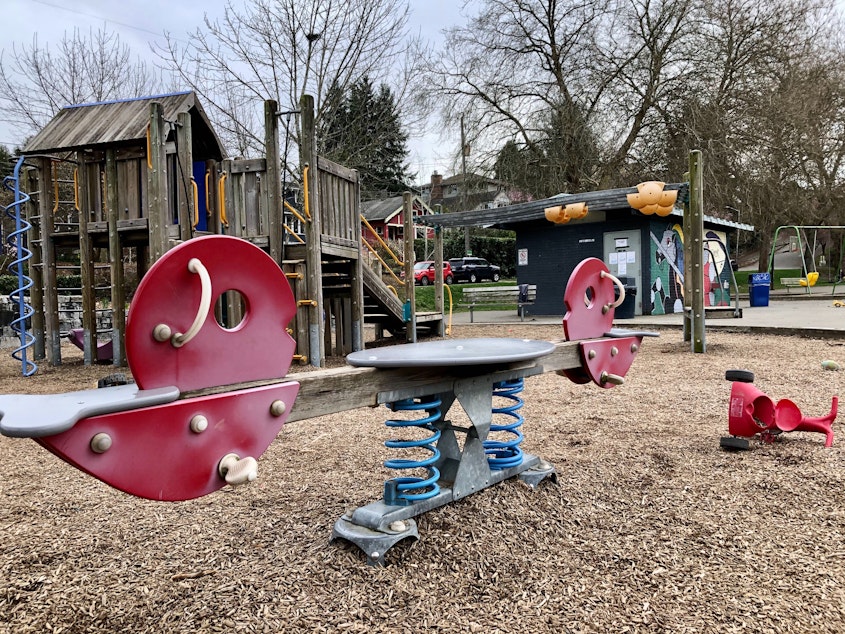Keep kids' play dates small, outside and low-contact during coronavirus pandemic, doctors advise

There's no consensus on how — or whether — to keep kids' social lives intact while minimizing the spread of the coronavirus.
Still, doctors agree on some guidelines to reduce risk.
When school, child care and extracurricular activities are canceled, play dates and hang-outs are the only obvious way for most kids to maintain social interaction with their peers - and for parents to easily connect in person with each other and commiserate about the strange new reality.
While kids tend to get only mildly ill with COVID-19, with less of the coughing that spreads it to others rapidly, they can also think nothing of sneezing on each other.
From slobbering on the same toy giraffe to wrestling on the rug, play dates can be germ-fests.
So what to do about kid hangouts? How much social distancing is healthy for kids as the weeks stretch on? Are there safe activities, settings, or ideal numbers of kids for get-togethers?
“I don’t think anyone truly knows, and you’re likely to get a variety of answers depending on whom you ask,” said Dr. Jonathan Pak, an assistant professor of medicine at Oregon Health & Science University.
Sponsored
Indeed, doctors and public health departments KUOW asked differed in their recommendations for children’s social lives during the pandemic.
But some general guidelines emerged.
The smaller the better
“Healthy children in small groups that are adequately supervised by a responsible adult or older teen may play together with all recommended hygiene measures,” said Dr. Michelle Terry, a pediatrician and clinical professor at Seattle Children’s.
What constitutes a small group? To Public Health – Seattle & King County, it varies based on age and location.
Sponsored
For younger children playing together indoors, “Think small—only a few friends at most,” Public Health advised in guidelines regarding gatherings of youth during the COVID-19 pandemic.
“The smaller [play dates] are, the better,” said Dr. Khushboo Mehta, a family physician and at Kaiser Permanente in Redmond.
Older children, who typically give each other more space, can get together in larger numbers, according to Public Health. “Teens should avoid spending time in groups larger than 10 and crowded places, like parties, retail spaces, and movie theaters,” the agency wrote.
Make outdoor plans when possible
What all sources agreed about is that al fresco play dates are ideal during this time. “Outside play should be encouraged, such as walking, bike-riding, and hiking,” Dr. Terry said.
Sponsored
“Outdoor gatherings are less risky than indoors ones since COVID-19 spreads more easily when people are close together in confined spaces,” Public Health advises, adding that children need active outside time daily.
“Research shows that daily time for kids outdoors also boosts the health and wellbeing of the adults in their lives,” the agency wrote.
Dr. Mehta said that during cold and flu season, outdoor play is always ideal to avoid spreading viruses – and should be prioritized during kids’ get-togethers.
Space kids out
Because young children, especially, tend toward spontaneous hugs, tackling each other or sharing the same harmonica, doctors advise thinking ahead to plan activities that let kids play together – yet maintain a bit of distance.
Sponsored
“Play games that involve fewer opportunities for touching,” recommends Public Health.
Activities like bike-riding, art projects, kicking a soccer ball or drawing with sidewalk chalk can feel perfectly normal and sociable at six feet apart or more. Public Health recommends regular cleaning of any toys that kids are all handling, like basketballs or Frisbees.
Dr. Mehta said it’s important not to stress too much about kids being kids during this time. “Let's say they did get on top of each other, which they're going to at some point - that's what kids do,” Dr. Mehta said. “That's part of their growth, and that's part of their thriving.”
Just remind them to wash their hands afterward, Dr. Mehta said.
Sponsored
Into the unknown
In planning social activities for kids, “The biggest thing is making sure that if you or your child is showing any signs of fever or respiratory symptoms or any other illness,” you don’t make plans – and cancel any that you have, said Dr. Mehta.
Still, lack of symptoms is no guarantee that someone is not contagious with the coronavirus, which is thought to transmit for days before or after an illness.
There is still much to be learned about the coronavirus, and how it’s spread, including by children.
Dr. Pak pointed to new, unpublished research that suggests that the virus remains at potentially infectious levels in the air for as long as three hours.
The study from researchers at the National Institutes for Health, Centers for Disease Control and Prevention and other institutions also found that the coronavirus remained on plastic and stainless steel – in other words, the stuff of toys and playground equipment – for as long as three days.
“If that is true, no play date is safe if someone is truly infectious,” said Dr. Pak, "and one can be infectious without showing symptoms for several days."
While zero social life means much less chance of transmitting the coronavirus, Dr. Mehta said, that’s not a realistic prospect if your child is going to be out of school for six weeks or longer.
“That’s probably even more harmful to their mental health as compared to what we’re trying to keep them safe from,” Dr. Mehta said.
Still, she said, if you’re on the fence about scheduling a play date for your little one, or deciding how much of an in-person social life to allow your teen, it makes sense to be cautious at this point.
“Information is rapidly evolving,” said Dr. Mehta. “Sitting on it, understanding and processing and getting a lot more information is probably not a bad idea, especially if it's just for a few more days,” Dr. Mehta said.




